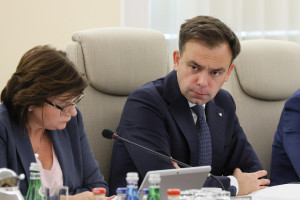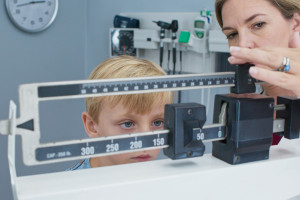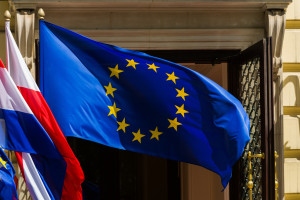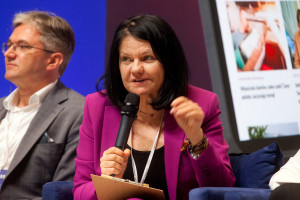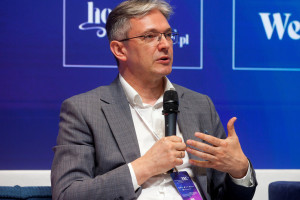Izabela Leszczyna sums up the Polish presidency. The compromise on the pharmaceutical package was a success

- The formal meeting of the Employment, Social Policy, Health and Consumer Affairs Council (EPSCO) began in Luxembourg on Friday (20 June)
- The meeting is chaired by Izabela Leszczyna, representing the Polish Ministry of Health, together with deputy ministers Katarzyna Kacperczyk and Marek Kos.
- Izabela Leszczyna pointed out in a conversation with journalists that the conclusion of nearly two-year-long negotiations, which will result in the first revision of EU pharmaceutical law in 20 years, is a great success.
- Earlier, Deputy Minister Kacperczyk announced the official launch of the trilogue on the pharmaceutical package.
Izabela Leszczyna , who chaired the meeting of health ministers in Luxembourg on Friday, told journalists that the Polish presidency's work on the pharmaceutical package between member states was a "great success." She emphasized that nearly two years of negotiations had been completed, and that the result would be the first revision of EU pharmaceutical law in 20 years.
Poland, which holds the EU Council presidency until the end of June, began negotiations with the EP on Tuesday. Denmark will continue them.
- Every compromise has the effect that everyone had to take a step back - emphasized the Minister of Health.
It was necessary - she pointed out - on the one hand to ensure good conditions for high-technology companies in order to protect competitiveness in Europe, and on the other hand the patient was important and the so-called generics, i.e. cheaper drugs, could replace expensive innovative drugs as quickly as possible.
For this reason, two changes were introduced in the package. First, the protection of innovative medicines was shortened by one year. - We have eight plus one, not eight plus two (as it is currently - PAP) - said Leszczyna.
According to the compromise negotiated by Poland, companies producing innovative drugs will be able to prevent competitors from accessing data used to develop these drugs for eight years . In turn, the so-called basic market protection for innovative drugs will be shortened from two years to one ; if the manufacturer meets additional conditions, it will be able to maintain two years of protection. This applies, for example, to introducing a product to the market that responds to unmet medical needs.
Secondly, Leszczyna emphasised, the so-called Bolar exception has been strengthened. - This means that a company that produces a cheaper substitute can enter the market with it practically the second day after the protection ends, she explained.
This is a mechanism that allows generic drug manufacturers to register a drug before its protection period expires. Polish pharmaceutical companies can introduce generics to the market faster thanks to it. The exception has been expanded to include, among other things, the possibility of participating in tenders.
The issue of the pharmaceutical package was also on the agenda of the meeting of health ministers on Friday in Luxembourg, who are meeting for the last time under the chairmanship of Poland.
The official start of the trilogue on this matter was announced a day earlier by Deputy Minister Katarzyna Kacperczyk, who also emphasised that it was a success of the presidency, which had worked out a compromise between EU health ministers on the biggest reform of EU pharmaceutical legislation in 20 years and had started negotiations.
On platform X, Katarzyna Kacperczyk wrote that the pharmaceutical package means:
- faster access to medicines, including new, innovative therapies
- preventing medicine shortages and better safeguards in case of crises
- cheaper drug substitutes – more generics and biosimilars mean lower prices
- development of innovations supporting clinical trials in Europe
- equal access to medicines regardless of which EU country you live in
- drug safety.
Let us recall that at the beginning of June the European Union member states accepted the compromise on the pharmaceutical package, developed during the Polish presidency.
In Luxembourg it's not just about medicines- During the presidency of the EU Council, we have shown that we are able to unite member states around common priorities. Our voice is heard because we base it on experience, dialogue and specific legislative proposals - wrote Izabela Leszczyna on Linkedin before the meeting in Luxembourg.
She pointed out that there are three key topics on the agenda that were taken into account when deciding on the priorities of the Polish presidency in health.
- Drug Safety. Ministers will discuss the Critical Medicines Act proposal presented during the Polish presidency, which is to increase the availability of critical medicines for patients, introduce tools to support production in Europe and diversify supply chains. Drug safety is also a pharmaceutical package , on which the Polish compromise proposal paved the way for agreement. It was possible to work out solutions that, on the one hand, stimulate the development of innovation, and on the other, support faster access to generic medicines and counteract shortages.
- Mental health of children and young people in the digital age - the Council will adopt conclusions supporting actions towards a safe and healthy digital environment for young people.
- Prevention in the EU – this will be a debate on effective legal and political tools to limit tobacco and alcohol consumption and to promote a healthy diet, physical activity and screening.
EU health ministers will meet in Luxembourg, and the European Commission will be represented by Commissioner Olivér Várhelyi .
- This is an important moment for the future of EU health policy, which will translate into increased drug safety, support for the mental health of the youngest and more preventive measures for all Europeans - wrote Leszczyna
Copyrighted material - reprint rules are specified in the regulations .
rynekzdrowia

